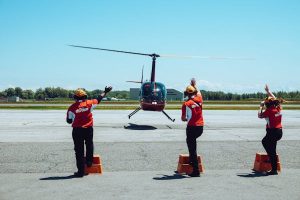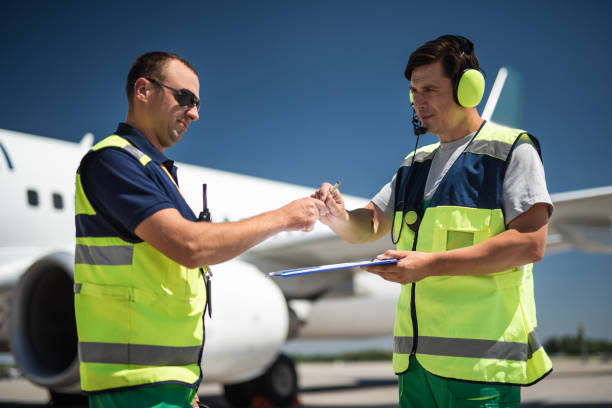
2024 Air Traffic Control Trainee Program Overview; The 2024 Air Traffic Control (ATC) Trainee Program is designed to equip aspiring air traffic controllers with the skills and knowledge needed to ensure the safe and efficient management of air traffic.
This comprehensive program blends theoretical education with practical training to prepare trainees for the demanding role of an air traffic controller.
READ ALSO THIS: Remington Group 2024 Graduate Development Programme
Program Structure of Air Traffic Control
- Initial Training:
- Classroom Instruction: Trainees start with foundational coursework covering aviation regulations, air traffic control procedures, meteorology, navigation, and communication.
- Simulation Exercises: Trainees use advanced simulators to practice controlling air traffic in a virtual environment, allowing them to develop decision-making skills and reaction times in a controlled setting.
- On-the-Job Training:
- Practical Experience: Under the supervision of experienced controllers, trainees work in live air traffic control environments. This includes handling real-time traffic, coordinating with other controllers, and managing various air traffic control sectors.
- Mentorship: Each trainee is paired with a mentor who provides guidance, feedback, and support throughout their training period.
- Assessment and Evaluation:
- Performance Reviews: Regular evaluations are conducted to assess trainees’ progress, skill proficiency, and readiness for full responsibilities. This includes both practical assessments and written exams.
- Certification: Upon successful completion of the program, trainees receive certification to work as air traffic controllers.
Air Traffic Service Assistants’ Tasks and Duties
Role Overview:
Air Traffic Services Assistants (ATSAs) support air traffic controllers by handling a range of administrative and operational tasks that facilitate the smooth operation of air traffic control services.
Key Duties:
- Administrative Support:
- Documentation: Prepare, process, and maintain flight logs, reports, and other documentation necessary for air traffic operations.
- Data Entry: Enter and update flight information, including flight plans and air traffic data, into control systems.
- Communication Support:
- Coordination: Assist in coordinating communication between pilots and air traffic controllers, ensuring clear and accurate transmission of information.
- Monitoring: Monitor radio communications and assist in relaying messages as needed.
- Operational Assistance:
- Equipment Management: Ensure that air traffic control equipment is functioning properly and report any malfunctions or issues.
- Information Dissemination: Provide relevant information to controllers and assist in the dissemination of weather updates, flight status changes, and other operational details.
- Customer Service:
- Passenger Interaction: Address inquiries from passengers and provide information about flight status, delays, and other relevant details.
Selection Criteria for Air Traffic Trainee Program
General Requirements:
- Educational Background:
- Minimum Qualifications: A high school diploma or equivalent. Some programs may require post-secondary education or specific coursework in subjects related to aviation or communications.
- Skills and Abilities:
- Communication Skills: Excellent verbal and written communication skills are essential for clear and effective interactions with pilots and colleagues.
- Attention to Detail: Strong attention to detail is required to ensure accuracy in managing flight data and operational procedures.
- Problem-Solving: Ability to quickly assess situations, make decisions under pressure, and manage complex scenarios effectively.
- Personal Attributes:
- Stress Management: Ability to handle high-pressure situations calmly and maintain focus during peak traffic periods.
- Teamwork: Strong collaborative skills to work effectively with other controllers and support staff.
- Aptitude Tests:
- Assessment: Candidates typically undergo aptitude tests to evaluate their logical reasoning, spatial awareness, and ability to multitask.
- Medical and Psychological Evaluation:
- Health Requirements: A thorough medical examination and psychological assessment to ensure candidates are fit for the demanding nature of the role.
READ ALSO: Empowering Women in STEM 2024: The Pathway to Scholarships
- Health Requirements: A thorough medical examination and psychological assessment to ensure candidates are fit for the demanding nature of the role.
Importance of Air Traffic Control Officers
Role Significance:
- Safety:
- Accident Prevention: Air traffic controllers play a critical role in preventing mid-air collisions and ensuring the safe separation of aircraft during all phases of flight.
- Emergency Handling: They are trained to manage emergencies, such as aircraft malfunctions or sudden changes in weather conditions, ensuring timely and effective responses.
- Efficiency:
- Traffic Management: Controllers optimize flight paths, manage airspace congestion, and minimize delays, contributing to the overall efficiency of air travel.
- Coordination: They coordinate with multiple stakeholders, including pilots, ground services, and other control centers, to ensure seamless operations.
- Operational Integrity:
- Regulatory Compliance: Air traffic controllers ensure that flight operations comply with national and international regulations and standards.
- System Integrity: They maintain the integrity of air traffic control systems and procedures, ensuring reliability and consistency in air traffic management.
In summary, the 2024 Air Traffic Control Trainee Program prepares individuals to meet the rigorous demands of the role, while Air Traffic Services Assistants play a vital support role in ensuring smooth operations
FAQs about Air Traffic Trainee Programmes
What is an Air Traffic Trainee Programme?
An Air Traffic Trainee Programme is a training course designed to prepare individuals for a career as an air traffic controller. The programme typically covers various aspects of air traffic control, including radar and non-radar control, communication, navigation, and safety procedures.
2. What qualifications do I need to apply for an Air Traffic Trainee Programme?
Requirements can vary by country and organization, but common qualifications include:
- A high school diploma or equivalent.
- Good mathematical and spatial awareness skills.
- Strong communication and problem-solving skills.
- Some programmes may require a college degree or specific coursework in aviation or a related field.
- Passing an assessment or aptitude test is often required.
3. How long does the training programme last?
The duration of an Air Traffic Trainee Programme varies but typically ranges from 6 months to 2 years. The programme usually consists of classroom instruction, simulator training, and on-the-job training.
4. What does the training involve?
Training includes:
- Classroom instruction: Covers aviation regulations, air traffic control procedures, and safety protocols.
- Simulator training: Provides hands-on experience with air traffic control systems and scenarios.
- On-the-job training: Practical experience in an operational environment under the supervision of experienced controllers.
5. What are the area of job creation after completing the carrier programme?
Graduates of an Air Traffic Trainee Programme can work as air traffic controllers in various sectors, including:
- Airport towers
- Area control centers
- En-route centers Career advancement opportunities may include supervisory roles, specialized control positions, or roles in aviation management.
6. Is there a certification process?
Yes, after completing the training programme, trainees usually need to pass a certification or licensing exam specific to their country’s aviation authority. Certification confirms that they are qualified to perform the duties of an air traffic controller.
7. What is the typical work environment for an air traffic controller?
Air traffic controllers work in high-pressure environments such as airport control towers, area control centers, or en-route centers. They often work in shifts to provide 24/7 coverage and must manage multiple tasks simultaneously.
8. Are there any physical or psychological requirements?
Yes, air traffic controllers need to meet specific medical and psychological standards. These may include:
- Good vision and hearing.
- Ability to handle stress and maintain focus for extended periods.
- Strong decision-making and multitasking skills.
9. What is the salary range for air traffic controllers?
Salaries for air traffic controllers vary by location, experience, and the organization. Generally, salaries can range from $60,000 to $150,000 annually, with potential for higher earnings with experience and additional responsibilities.
10. How can I apply for an Air Traffic Trainee Programme?
To apply, you typically need to:
- Check the requirements of the specific programme you’re interested in.
- Submit an application through the relevant aviation authority or organization.
- Complete any required assessments or tests.
- Attend interviews and undergo background checks as part of the selection process.

